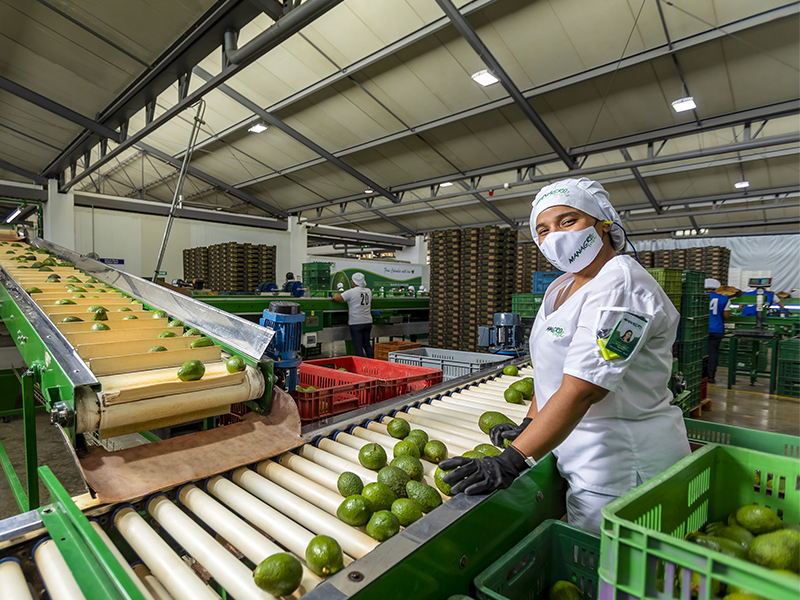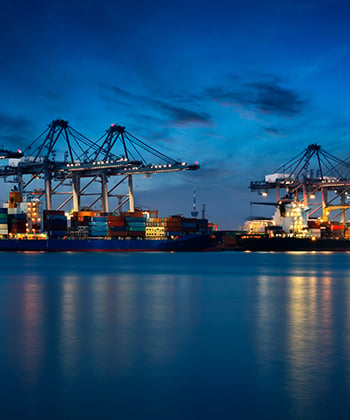Colombia is recognized in demanding international markets as a supplier of high-quality fruits and vegetables, which favors its positioning as an attractive investment destination in the region. Its ideal conditions for year-round production, the relevance of the sector for the country, and multiple investment incentives have made it a focal point in Latin America for doing and expanding business; the arrival of major players in the country is proof of this.
PRODUCTION CAPACITY OF FRUITS BY REGION
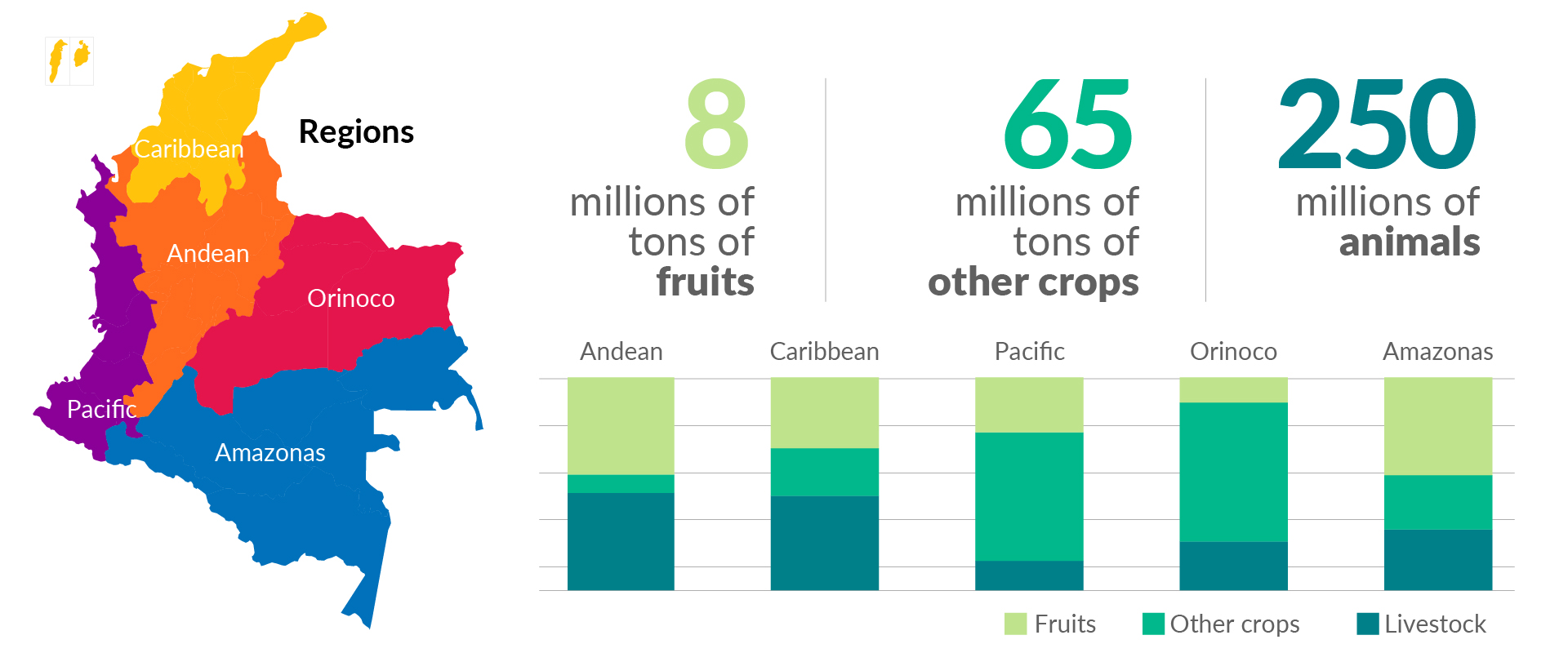
Where every region offers an opportunity to produce fruit and other agricultural products, reaching +73.2 millions tons.
Source: Ministry of agriculture and rural development. *Main products

COLOMBIA HAS EXCELLENT CONDITIONS FOR FRUIT CROPS
Colombia is the seventh rainiest country in the world, and its level of water stress is one of the lowest in the region. Thanks to its location in the intertropical zone, the country enjoys high irradiation and favorable temperatures, which are decisive factors for growth. Additionally, with a constant temperature throughout the year and no seasons that restrict planting, it is possible to have production for a significant part of the year. The variety of thermal floors also allows for the production of a wide diversity of fruits.
Colombia's agricultural frontier contains a large percentage of highly fertile soils. The presence of volcanic soils, andisols, and molisols, which are ideal for agriculture, is noteworthy, with over 9 million hectares in the country.
TO FURTHER EXPLOIT ITS ADVANTAGES, THE COUNTRY NOW WANTS TO BET ON FRUIT EXPORTS
Colombia is already a major producer of fruits and exotic fruits. In 2021, the national production of fresh fruits reached 12.4 million tons, with an annual growth of 3.7%, between 2017 and 2021.
There are ample areas available to increase fruit production for export. According to FAO, Colombia is one of the seven countries that concentrates more than 50% of the land with agricultural potential and vocation that has not been used yet for agriculture.
On the other hand, the producing regions have labor available for export production. More than 3.2 million people in the country are engaged in agricultural production.
In addition, Colombia has a great connection with the world: the country'Ss air and sea connectivity allows it to offer competitive delivery times, with access to the United States in 5 days and access to the Netherlands in 12 days.
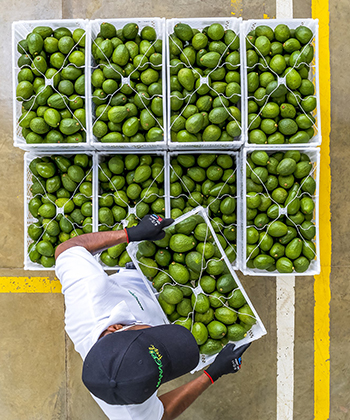
PROGRAMS ARE IN PLACE TO BOOST PRODUCTION AND EXPORTS
The country has implemented reforms to eliminate market, integration, and entrepreneurship regulatory obstacles. In the study "Enabling the business of agriculture", the World Bank highlights the progress that Colombia has made in reducing regulatory barriers to the market and integration and entrepreneurship in agriculture, thanks to government policies, which has allowed it to position itself as the country with the best score in Latin America.
In addition, the country has an ecosystem that supports producers with specialized entities in the most critical areas of the production process: agricultural health and food safety, research and development, technical assistance and support, land use planning and product management, and lines of financing.
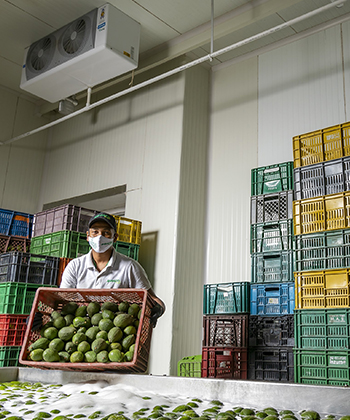
COLOMBIA HAS A FAVORABLE CLIMATE FOR FOREIGN DIRECT INVESTMENT
The country has a friendly environment for foreign direct investment. According to Doing Business, Colombia ranks first in Latin America regarding credit facilities and protection for minority investors.
The exchange rate facilitates investment since, in the last year, it has remained above 3,500 pesos per dollar, favoring the purchasing power of investors.
The national government offers an attractive incentive policy for cocoa investments. These include income tax exemption for ten years for rural development projects; income tax incentives for investments made in ZOMAC; and Free Trade Zones - with the possibility of agro-industrial and/or sole proprietorship. In addition to benefits in the payment of taxes: tariffs, income, and VAT.
Finally, major international companies have invested in the fruit sector, including Managro Fresh (Israel), Eurofresh (Spain), Sovena (Portugal), Green SuperFood (Chile), Hortifrut (Chile), and Renewable Resources Group (United States).
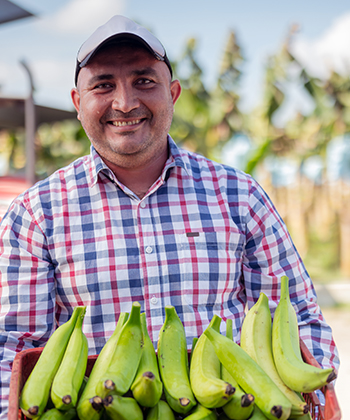
THE SECTOR OFFERS ATTRACTIVE INVESTMENT OPPORTUNITIES ALONG THE VALUE CHAIN
The country has ample land available for investment in planting new crops with a high aptitude for the development of crops such as avocado (1.2 million hectares), banana (0.7 million hectares), strawberry (1.1 million hectares), mango (3.9 million hectares), papaya (4.2 million hectares) and pineapple (4.6 million hectares) (UPRA - Rural Agricultural Planning Unit (Unidad de Planificación Rural Agropecuaria.
There is also an opportunity to increase cultivation areas for organic fruit production for growing niche markets. It is important to note that Colombia is already one of the top 10 suppliers of organic products in the European Union. On the other hand, there is an opportunity for financing projects to obtain certifications required by the international market, such as organic, Global G.A.P., Smeta, and Fairtrade.
Opportunities have also been identified for establishing fruit processing plants to add value and export. For example, in the production of IQF (Individually Quick Freezing) fruits, dehydrated, freeze-dried, pulp, and jams, among others, to add value and reach distant markets. Also, in producing oils and other derivatives to meet the demand of different market segments. In the country, there are opportunities for investment in storage infrastructure and packing houses. On the one hand, there are opportunities for investing in fruit storage infrastructure to avoid waste due to weather conditions and marketing times.
On the other hand, investment in packing houses for selection, preparation, and export. Finally, there is an opportunity for investment in technological development to take advantage of waste for use in different industries. For example, pharmaceutical industry ingredients, cosmetics, and others; Bioplastics for the packaging industry and energy generation from renewable sources.


PROCOLOMBIA is the entity in charge of promoting Exports, International Tourism, Foreign Direct Investment and the Country Brand, in order to position Colombia in the world. Get to know the national and international network of offices, where you will find comprehensive support and advice.

